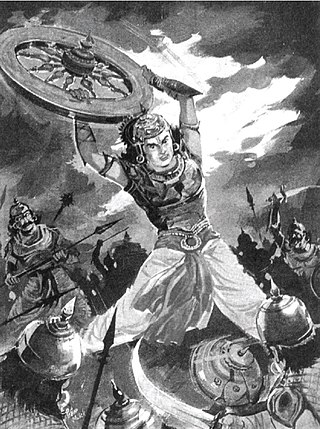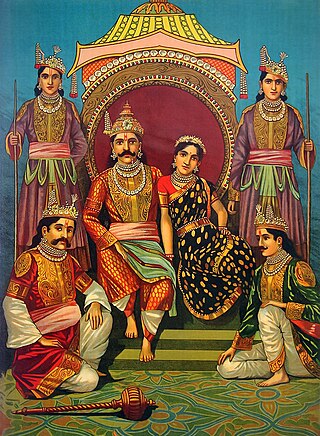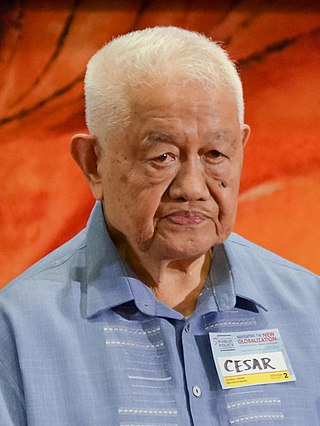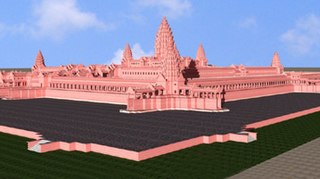Naga or NAGA may refer to:

INS Viraat was a Centaur-class light aircraft carrier of the Indian Navy. INS Viraat was the flagship of the Indian Navy until INS Vikramaditya was commissioned in 2013. The ship was completed and commissioned in 1959 as the Royal Navy's HMS Hermes, and decommissioned in 1984. She was sold to India in 1987. INS Viraat was commissioned into the Indian Navy on 12 May 1987, and served for almost 30 years.

Abhimanyu is a warrior in the Hindu epic Mahābhārata. He was a young and valiant warrior of the Kuru lineage, born to Arjuna—the third Pandava brother—and Subhadra—the sister of the deities Krishna and Balarama. He was also one of the few individuals, along with his father, who knew the technique to enter the Chakravyuha, a powerful military formation. Abhimanyu was raised by his maternal family in Dvārakā because the Pandavas had been exiled for thirteen years by their cousins, the Kauravas. After his father's return, his marriage was arranged with Uttarā, the princess of the Matsya Kingdom.
Uttara, which means "north" in Sanskrit and many other South Asian languages, may refer to:

Yudhishthira also known as Dharmaraja, was the king of Indraprastha and later the King of Kuru Kingdom in the epic Mahabharata. He is the eldest among the five Pandavas, and is also one of the central characters of the epic.

Nakula was the fourth of the five Pandava brothers in the ancient Indian epic, the Mahabharata. He and his twin brother Sahadeva were the sons of Madri, one of the wives of the Pandava patriarch Pandu, and Ashvini Kumaras, the divine twin physicians of the gods, whom she invoked to beget her sons due to Pandu's inability to progenate. Nakula is described as the most handsome man of his lineage, and was renowned for his beauty, skill in swordsmanship and horse keeping.

Sahadeva was the youngest of the five Pandava brothers in the ancient Indian epic, the Mahabharata. He and his twin brother Nakula were the sons of Madri, one of the wives of the Pandava patriarch Pandu, and Ashvini Kumaras, the divine twin physicians of the gods, whom she invoked to beget her sons due to Pandu's inability to progenate. Kunti, Sahadeva's step-mother, loved him the most despite his birth to Madri. Sahadeva is renowned for his wisdom, knowledge of astrology, and skill in swordsmanship.

Virata was the king of the Matsya Kingdom, in whose court the Pandavas spent a year in concealment during their exile. Virata was married to Queen Sudeshna and was the father of Prince Uttara and Princess Uttarā, who married Abhimanyu, the son of Arjuna. Abhimanyu and Uttara's son Parikshit succeeded Yudhishthira on the throne of Hastinapura, after the war of Mahabharata. He is the titular character of the Virata Parva, the fourth book of the epic Mahabharata

Cesar Enrique Aguinaldo Virata is a Filipino former statesman and businessman who was the fourth Prime Minister of the Philippines from 1981 to 1986. He is currently serving as the corporate vice chairman of the Rizal Commercial Banking Corporation. He is the eponym of the Cesar Virata School of Business, the business school of the University of the Philippines Diliman.

Trigarta was an ancient Indo-Aryan kingdom based in the region of modern day Punjab. The focal point of its administration was situated in Jalandhar. However at its zenith it encompassed the hill territory extending from the Sutlej to the Ravi, with a secondary capital in Kangra. According to a genealogical record of the Kangra State, the first significant monarch is identified as Susarman, who is recognised for his participation in the Kurukshetra War based in the early Iron Age. It was during this period that the kingdom held Multan.

Uttarā was the princess of Matsya, as described in the Hindu epic Mahabharata. She was the daughter of King Virata and Queen Sudeshna, at whose court the Pandavas spent a year in concealment during their exile. During this period, she learned music and dance from Arjuna, the third Pandava, and later married his son, Abhimanyu. Uttarā was widowed at a young age during the Kurukshetra War. Following the Pandavas' victory in the war, she and her unborn son were attacked by Ashwatthama, and were saved by the divine intervention of Krishna. Her son Parikshit saved the Kuru lineage from extinction, and became a well-known monarch celebrated in both the Mahabharata and the Bhagavata Purana.
Operation Viraat, along with Operation Trishul, was an anti-insurgency operation launched by the Indian Peace Keeping Force (IPKF) against the Liberation Tigers of Tamil Eelam (LTTE) in April 1988 in the Northern Province of Sri Lanka, in the Elephant Pass and the districts of Mannar, Mullaitivu and Vavuniya.

Uttara, also rendered Uttara Kumara is a prince of the Matsya Kingdom featured in the Hindu epic Mahabharata. He is the eldest son of King Virata and his wife Sudeshna, at whose court the Pandavas spend their one year of anonymity during their exile. His sister Uttarā marries Abhimanyu, the son of Arjuna.

Virata Parva, also known as the “Book of Virata”, is the fourth of eighteen books of the Indian epic Mahabharata. Virata Parva traditionally has 4 parts and 72 chapters. The critical edition of Virata Parva has 4 parts and 67 chapters.
Leonides Sarao Virata was a Filipino economist. During his lifetime, he served as executive officer of various government and private companies in the country. He was appointed the secretary of the Department of Commerce and Industry from 1969 to 1970 and then chairman of the Development Bank of the Philippines from 1970 till his death in 1976. He hailed from the city of Imus in Cavite province.

Viraat Ramayan Mandir is a under-construction Hindu temple complex located at twin villages of Kaithawalia and Bahuara near Chakia in East Champaran district, Bihar, India. It is being built with a cost of 5 rupees and is planned to be 123 metres (405 ft) high, double height of Angkor Wat Hindu Temple in Cambodia, and to have a hall that seats 20,000 people. The construction of the temple was scheduled to start in June 2015, but has been delayed following the Cambodia government's protest to the government of India which successfully won over Temple construction. Virat ramayan mandir's fully financed by mahavir mandir patna trust and client is tata company, company which given the civil work to suntech infra solutions. Company which is Delhi based company. Which work in previous in many Bihar project like in ntpc, fertilizer and iocl barauni projects successfully. This work is planning to finished in 2026.
Virat or Viraat is an Indian male given name that may refer to the following people:











